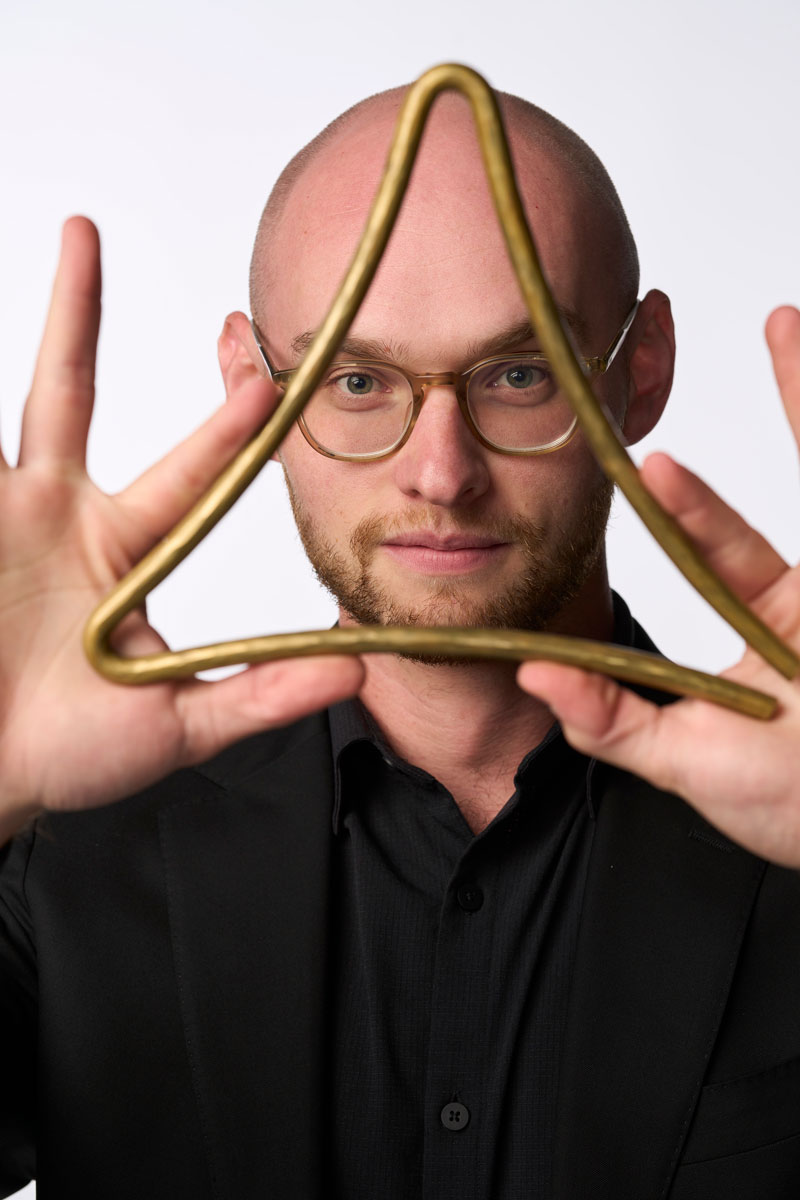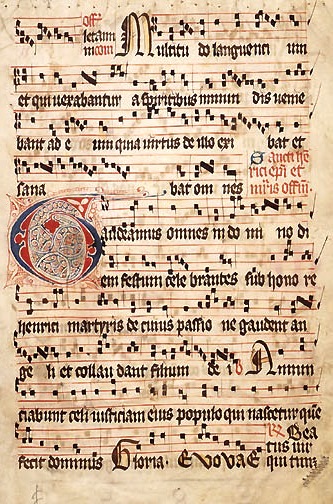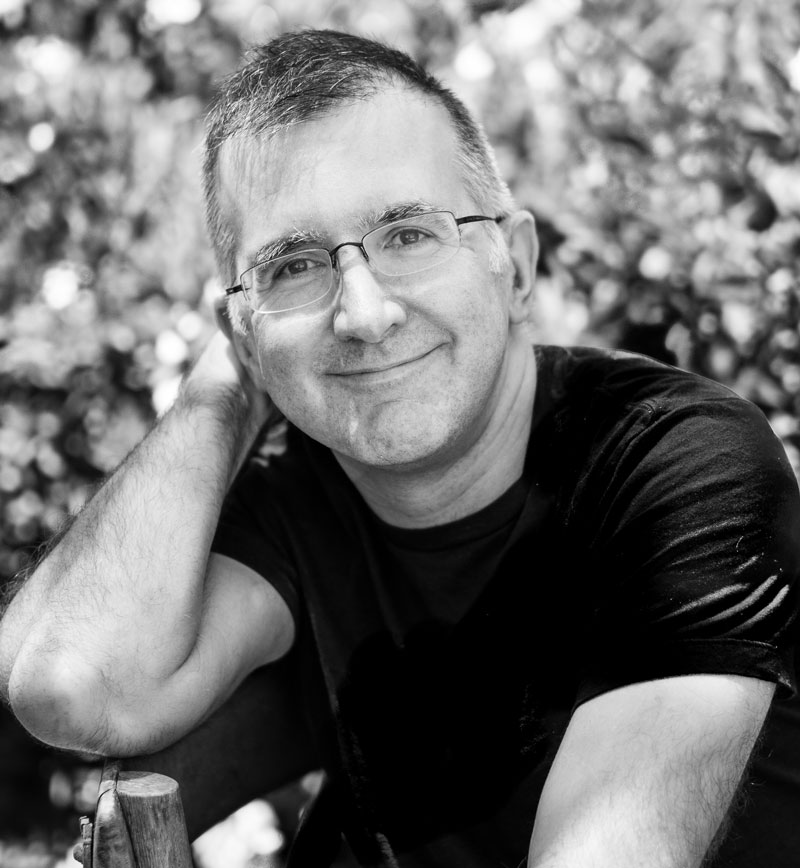
Hi, I’m Joe. This is a project we’re calling “Fresh Ears.” It’s a series of pre-concert talks about new music, yes, but really, it’s an excuse for us to spend time together thinking about how we listen and why it matters. People have been making sound, organized or not, for as long as we’ve been trying to talk to each other. Before we had the kind of language we do now, we had noises that meant danger over there, or celebration over here, or I love you, or I miss you. Eventually we started writing some of it down because stories have a habit of growing. You can trace that urge in music starting with the earliest cuneiform tablets in around 1400 BCE, chat notation in the Byzantine era, Gregorian chant notation, and the five-line musical staff as we know it today (and all the variations in between). This is why I’m obsessed with notation. I think that the ways in which composers communicate their ideas and themselves through their music is almost like magic. We learn so much about a person and also about ourselves when we engage with the choices a composer or an artist has made — it communicates their values, what’s important to them, how their imagination works, and then it’s up to us to translate this moment in a person’s life into something so fleeting, a sound going up in smoke.

The Introit Gaudeamus omnes, scripted in square notation in the 14th–15th century Graduale Aboense, honors Henry, patron saint of Finland.
There’s an interview with frequent CSO collaborator Conrad Tao in which he describes his approach to music as “the foraging for and leaving of traces,” which I find to be an immensely beautiful idea. As performers and as listeners, I hope that we can find traces of someone’s humanity in their work and reveal something of our own through engaging with it. In the same interview, Tao recalls a conversation with American Composer and CSO regular David Lang about performing his work. He'd said that “the pieces depend on you bringing something to them. The pieces are a proposal.” I think, too, that listening to new work requires us to bring something of ourselves. After all, art is a reflection on and reconstruction of the world around us, offering us the opportunity to glimpse into someone else’s specific brain at some specific time in their lives and hopefully consider our own lives differently.
If you have ever felt like the “new piece” on a program was the thing you had to get through, I get it. There are so many pieces already written attempting to explain why audiences do not like modernism in music. Alex Ross, the brilliant classical music critic for The New Yorker and author of numerous books on music and listening, writes at length in his 2010 piece “Why do we hate modern classical music?” largely writing about the arguments against contemporary music and how other artistic institutions have navigated the “idolatry” that often puts classical music in a box. He argues:

"What must fall away is the notion of classical music as a reliable conduit for consoling beauty – a kind of spa treatment for tired souls. Such an attitude undercuts not only 20th-century composers but also the classics it purports to cherish. Imagine Beethoven's rage if he had been told that one day his music would be piped into railway stations to calm commuters and drive away delinquents. Listeners who become accustomed to Berg and Ligeti will find new dimensions in Mozart and Beethoven. So, too, will performers. For too long, we have placed the classical masters in a gilded cage. It is time to let them out.”
I agree with what he’s getting at here. I listen to the canon of the repertoire differently when I commit energy to the composers I’ll talk about in this “Fresh Ears” series, and I certainly perform differently. Discovery is perhaps my favorite part of this life. When I was in high-school, my geometry teacher, Ms. Brady, drew attention to the face I made when we’d work through a complex proof. I was astonished to realize that we had ended up at such an elegant solution from a tangled beginning. I still chase that feeling. It’s why I do a little too much research. It’s why I test formats. It’s why I am willing to try something that might not work in order to find the thing that does. If you’re going to show up an hour early, I want to meet you there with curiosity and honesty. I want you to feel like someone on stage knows you are in the room. In this series, I hope that you can find some discovery in this music, and I hope that that inspires you to find more.
So, what happens if you come to “Fresh Ears”? About an hour before the concert begins, we’ll talk about the program’s new music. I’ll share what I think is interesting to listening for, I’ll tell you what changed for me in rehearsal that week, and when we can, we’ll chat with the composer themselves.
There is also a little ecosystem around these talks, because if you’ll indulge me in talking about contemporary music, I ought to give you some more to chew on. On the “Fresh Ears” webpage and the digital program, you will find short “listen ahead” notes, composer playlists, links to what I think are representative moments with a few lines on what to notice, and quick videos from rehearsal where we talk about what we are figuring out. There is a box for your questions and your reflections. If you like homework, you will be very happy. If you do not, you can ignore it and still be completely fine.
Here is who I’ll speak about this season:
Anna Clyne on Oct 3–4; Listening Notes
Lisa Bielawa on Nov 29–30
Daníel Bjarnason on Jan 10–11
Anna Thorvaldsdottir on Feb 6–7
Jennifer Higdon on May 8–9
You don’t have to like everything! Part of the point here is noticing what you like and why, what you don’t and why, and how your reasons change as you get more context or just more time. I’m not asking the classics to move aside. I am saying the present tense belongs in the same room, and that meeting it with an open mind will change how you hear the past, present and future.
If that sounds interesting, come early. Bring a friend who says they “don’t get” new music. Bring your questions, your skepticism and your ears.
See you there,
Joe